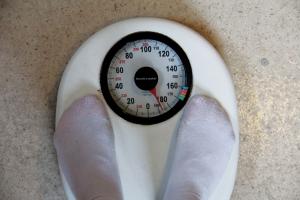 Jill Barrile photo: Freshmen are advised to watch food choices and portion sizes, and to avoid emotional and stress eating, vending machines, pop and alcohol.Making the transition between living at home and living at college can be difficult for students, not only in terms of school work but also during meal times.
Jill Barrile photo: Freshmen are advised to watch food choices and portion sizes, and to avoid emotional and stress eating, vending machines, pop and alcohol.Making the transition between living at home and living at college can be difficult for students, not only in terms of school work but also during meal times.
College is the first time many students are making independent choices, and parents are not around to help their children make healthy ones. The infamous “Freshman 15” is one thing that students don’t want to gain when transitioning to college.
“First goal is to avoid it,” Executive Director of Wellness Judy Smith, Ph.D., said. “(It is) easier to avoid the pounds then have to lose them.”
Smith explained tips to avoid the weight gain during college. These include watching food choices and portion sizes, avoiding emotional and stress eating, going to the Rec Center, eating healthy snacks, getting a good night’s sleep, practicing stress management skills and avoiding vending machines and pop.
“Alcohol is not your friend [either] when it comes to weight,” Smith said.
Alcohol contains empty calories that fill your stomach but do not provide any nutrition.
Smith also suggests eating with a friend who will support your healthy eating and having a plan when going to the dining hall for meals. If you are struggling with meals, get takeout when going to Egan Dining Hall in order to control the food temptations.
One common pattern the Cohen Health Center tends to see is that students are only eating fruits and vegetables. Smith said this type of unbalanced eating will set students up for failure because bodies will start craving foods they’re not getting.
For Northwest Pennsylvania Highmark Insurance members, there are many opportunities to see a nutritionist for free and develop an appropriate eating plan.
While all of these tips must be followed for a healthy lifestyle, a previous report by MSNBC in early November stated that the Freshman 15 may not be all it’s cracked up to be.
The report states that 25 percent of freshmen lose weight and that if there is weight gain, it is between 2.4 and 3.5 pounds.
 Jill Barrile photo
Jill Barrile photo
Freshman Lauren Smith experienced this claim firsthand.
“I was pleasantly surprised when I first got here because I thought I would gain that dreaded Freshman 15, but I … actually lost weight,” Smith said.
She explains that she will keep herself in check as she gets used to college, just in case.
Freshman Monica Perez said, “It is quite enticing to have the ability to eat limitless amount of food.”
Perez is not concerned about the Freshman 15, however. She said she makes sure her meals are balanced.
According to the MSNBC report, freshmen aren’t the only ones who have to be on the watch for weight gain. During four years in college, the average woman gains 8.9 pounds, and the average man gains 13.4 pounds.
Freshman Resident Assistant Katie Pizzuti says that she doesn’t believe this myth to be true either.
“I think most people that see themselves gaining any weight (especially girls) will turn around and start working out. As much as I see my girls studying together and snacking, I see them going to yoga and dance classes. So I can stand behind that it’s not accurate,” she said.
The nurses at the Health Center are always available to help students with nutrition and to connect them with any appropriate nutritional assistance.




